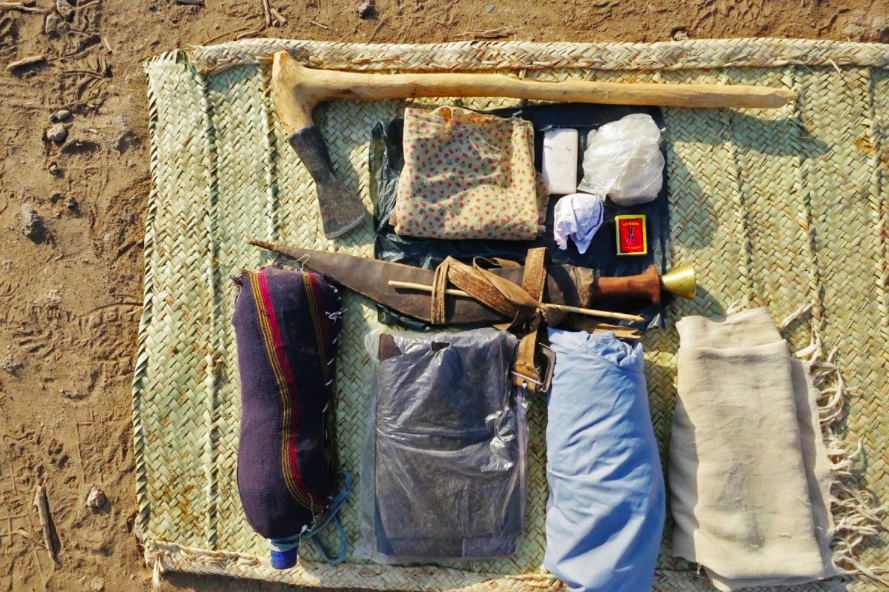
A long walk through—and around—the global headlines
“Walking in Georgia,” by Murat Yazar. Journalist Paul Salopek is retracing the path of early human migration through his Out of Eden Walk, a seven-year project that originated in Ethiopia in 2013 and will conclude 21,000 miles later in South America. Knight Foundation supports the project to develop new forms of digital storytelling and audience engagement. Related Link
“Journalist and Pulitzer winner Paul Salopek to test new digital storytelling and audience engagement tools on seven-year journey around the world” – press release, 01/13/2014.
Fast is good. So says the gospel of journalism.
To be slow is an insult. An epithet. A flaw. If you are slow, you get scooped. You are left behind. You become irrelevant. You fail.
This adoration of speed has only intensified as the Web takes the lead in disseminating news. Click on any news aggregator. Thousands of micro-headlines bloom every day, every hour, across the globe. (As I write this post, there are 19,418 articles available on the terrorism attacks in France on Google News alone.) Media information is exploding partly because, today, anyone with a cellphone is a reporter—or rather, a recorder of current events. (Globally, there are 7 billion mobile devices and connections now in use: one for every bipedal hominid with prehensile thumbs on the planet.) Watching breaking-news headlines churn online is like watching plankton surfacing and sinking ceaselessly, endlessly and in the end incomprehensibly, on a vast yet shallow digital sea. This is why I’m walking across the world.

Ethiopian nomad’s toolkit. Photo by Paul Salopek.
Supported by new funding from Knight Foundation and by the National Geographic Society, I am retracing, on foot, the ancient pathways of the first human diaspora out of Africa some 60,000 years ago. I am reporting little-covered stories along the route, using deep history as my guideposts. I started walking two years ago in the Rift valley of Ethiopia. Since then, I’ve made it 4,000 miles through Africa, the Middle East and the Caucasus. My journey will end in 2020 at the tip of South America, the last nook in the continents settled by our ancestors.
This long project, called the “Out of Eden Walk,” is adamantly counterintuitive.
It is an exercise in “slow journalism.” The premise is that the world doesn’t need yet more instant news: We’re drowning in information. What we lack and yearn for is more meaning. By moving against the torrent of ephemeral media gratification, by slowing down, this 7-year narrative walk across the world can be a laboratory for demonstrating how all reporters can capture vanishing mindshare on the Web.
Let’s be clear: Slow journalism isn’t just about rehashing or “retelling” major news events through boot-level reporting—sharing the “untold stories,” say, of villagers in war.
Instead, what I’ve learned from walking through the news is that slowing down actually breaks news. It spawns original work. It strikes narrative gold.
Walking out of Ethiopia to the Gulf of Aden, for example, slowly revealed the bizarre connections between the demise of marine science and Somali piracy. And later, while trekking through Saudi Arabia, I realized for the first time in my life how cars have fundamentally rewired our brains and utterly changed the world. Such insights come from immersive reporting. I have discovered, via thousands of comments posted on my National Geographic blog, that readers are thirsty for such insights. Note that there is no Luddite impulse here. The “Out of Eden Walk” deploys cutting-edge Web storytelling technology—interactive digital maps and geocoded reporting—to get these unique stories across.
During the next phase of the journey through Asia, with Knight’s help, we are taking the walk’s storytelling mission to a whole new level.
We plan to radically expand reader engagement and interactivity across languages and cultures. We will experiment with novel methods of public outreach and share lessons learned with all our media colleagues. After all, one of the ideals of slow journalism is to deepen meaning, nuance and understanding among our readers. This is one of the prerequisites for the survival of democracy in an increasingly complex and interconnected world.
Recent Content
-
Journalismarticle ·
-
Journalismarticle ·
-
Journalismarticle ·


